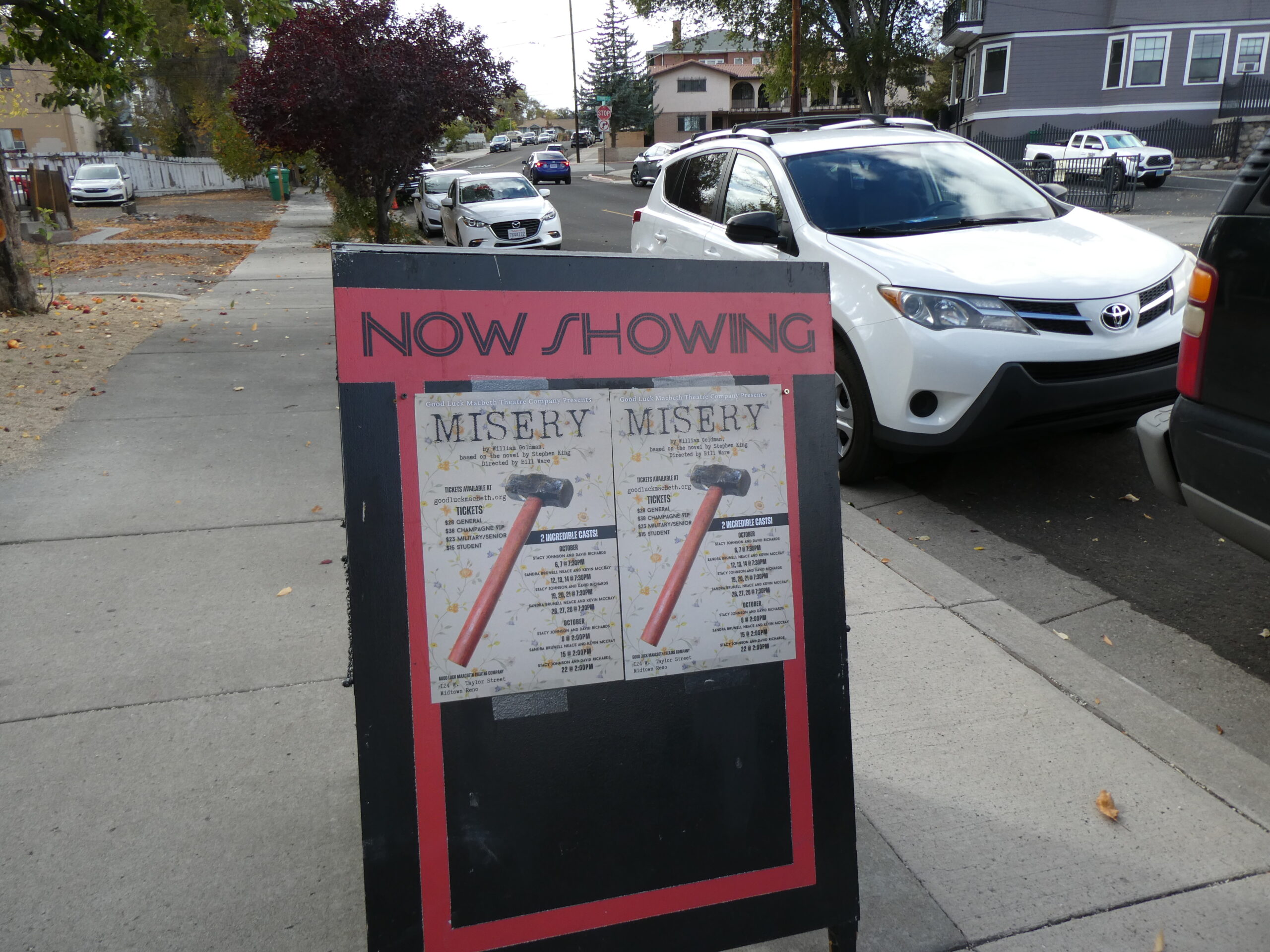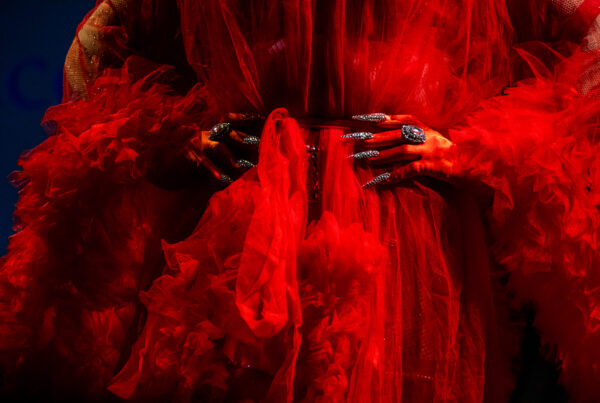In the spirit of the Halloween season, Midtown Reno’s newest community theater, Good Luck Macbeth, took to the stage on 124 W. Taylor Avenue this October with an adaptation of a work by Stephen King.
Good Luck Macbeth was founded in 2009 in defiance of long-standing theatrical superstition around saying “good luck” or “Macbeth” in a theater venue. If there’s any doubt about whether these no-no’s are still real, rest assured the tradition of spitting on the ground and running in three circles around it if you accidentally say one still remains — at least in high school theater.
Since its inception, the plucky theater company has become particularly known for its outrageous, no-budget parodies. Just this year, two will have hit its stage, from this summer’s “Jaws” parody, “Shark!” to this winter’s forthcoming “Die Hard” pastiche, “Die Difficult.”
It’s quite the turn to go from something like that to something as harrowing as an adaptation of Stephen King’s novel “Misery,” but Good Luck Macbeth handled the transition well. This is partially because the cast and crew boasted an excellent command of suspense — but also, crucially, because they were able to seize the opportunities in the script’s abundant morbid humor.
Set in small-town Colorado in the 1980s, “Misery” opens with famed historical novelist Paul Sheldon waking up in a cramped, unfamiliar house. From his makeshift caretaker Annie Wilkes, we learn that he nearly died in a car accident leaving the inn where he always completes his novels. His injuries have rendered him bedridden, there’s no chance of moving him to a hospital until the pass clears up and Annie, a former nurse, is thrilled to have him in her sole care because she’s his biggest fan.
In an expertly torturous slow burn, we learn bit-by-bit that Annie has placed so much hope, identity and fervor into Paul’s works that she actually poses a threat to him. And when it seems like his career — or the fate of the main character from his books, Misery Chastain — is set to go against her wishes, she’ll do anything to keep the novelist, and the novels, under her control.
The script, which was actually written before the famous 1990s film adaptation and penned by its screenwriter, William Goldman, has a cast of just three. Good Luck Macbeth’s answer to this intimate setup was to rotate the two lead roles.
For two weekends, University of Nevada, Reno theater professor Sandy Neace took the role of Annie Wilkes, with Kevin McCray as Paul Sheldon. For the other two weekends, Stacy Johnson played Annie Wilkes, with Dave Richards as Paul Sheldon. Jayton Newbury, a University theater alumnus, united the two casts as a sweet, oblivious — or is he? — county sheriff.
Stacy Johnson’s Annie was the perfect cocktail of sincere and controlling, striking a delicate balance between comedy and terror. She leaned hard into Annie’s childish, almost charmingly goofy tendencies, managing the shift expertly when Annie suddenly went dark. Her physicality and big, unflinching emotion made her easy to follow into places of panic and rage. And even there, her realistically-crafted insecurity made her easy to connect with at the same time.
The same was true for Dave Richards’ Paul Sheldon, with cynicism and a crotchety-old-writer effect perfectly balancing the audience’s sympathy for his imperiled situation. Richards — whose comedic experience is as recent as this summer’s production of “Shark!” — was hilarious with dramatic irony in hand, both in charged interactions with his controlling caretaker and when given full command of the stage in her absence.
In both cases, humor served the actors immensely well as an emotional crowbar, allowing the production to pry open an audience member’s sympathetic doors before unleashing the heightened stress “Misery” and its adaptations are known for.
A heady dose of scarily relevant commentary, however, came in tandem with a white-knuckled grip on Good Luck Macbeth’s theater seats.
If “Misery” had points to make when it was written, the growing intensity of fandom, and artists’ newfound accessibility to their fans online, makes them even sharper now. Almost all of us have fallen into the trap of deifying the creator of a favorite property, claiming ownership over something we didn’t make or, as Annie does, placing such moral stock in someone’s creative work that an authorial decision becomes a betrayal.
In one particularly prescient scene, “Misery” revealed the sinister, hyper-capitalist underpinnings of fans’ demands that artists cater to their tastes, and in a timely manner, no less. Decades before readers would pester George R. R. Martin about “finally” releasing “The Winds of Winter,” the sledgehammer’s infamous role in the climax of “Misery” would make it clear that at the heart of such demands is a fan ethic that prizes the author’s output over the author as a human being.
A detailed, claustrophobic set with expert foreshadowing of Annie Wilkes’ character, and ambient music selections that never missed, made Good Luck Macbeth’s “Misery” a fresh, intensely agonizing viewing experience that had both familiar and new audiences on tenterhooks.
At least, the people cursing under their breath at each plot twist, in the seats to my right, seemed to think so.
Good Luck Macbeth’s 2023 season concludes with Die Difficult, running from Dec. 1 to Dec. 23.
Peregrine Hart can be reached at peregrineh@unr.edu or on Instagram @pintofperegrine.










